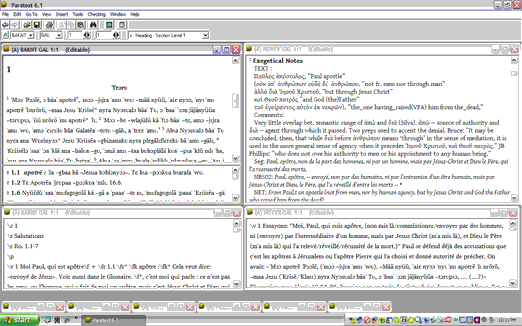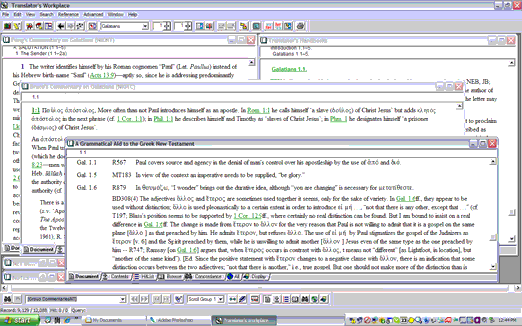Below is the process that we are following in translating the Bible into the Bakwé language.
Language analysis
Of course, before translating we had to learn the Bakwé language and do a certain amount of analysis. Each step of the way we have trained consultants in each area of expertise helping us along.
Here is a list of first steps we had to take before beginning translation:
Ethnology analysis: the study of Bakwé culture, including religious beliefs.
Phonology analysis: the analysis of the sound system of the language with the goal of developing an adequate alphabet.
Grammar analysis: the analysis of basic Bakwé grammar and sentence structure.
Discourse grammar analysis: the analysis of the rules for putting paragraphs together.
Biblical key terms
Over a period of about a year and after numerous meetings in different villages an ad hoc committee of representatives from the Bakwé community, including the seven different denominations in the area, decided on a list of biblical key terms to use in the translation. For example, words for “angel”, “Holy Spirit”, and “prophet”, etc.
First draft
First, I study the original text in Greek, including textual differences, and relevant commentaries. I then suggest a translation to my Bakwé co-translator, Alexis. Alexis then turns what I have into natural Bakwé style. He then passes his draft back to me. I make sure everything in the Greek is there. We produce successive drafts, making improvements and revisions until we think we have given it our best try.
The computer is a big help. For tools I use three resources: Paratext, developed by the United Bible Society, Translators Workplace, developed by Wycliffe, and Logos Bible Software.
Checking our draft
Village testing check
Alexis records our draft in audio format and then plays this back to various Bakwé speakers. We try to get feedback from both the young and the old, and both men and women. At this point we are mainly getting feedback on the naturalness of the translation. Alexis asks content questions and makes notes. At this point we have to determine whether the translation is unnecessarily impeding understanding.
Where the changes are warranted we make them or add footnotes.
Back Translation
A Bakwé person who has not participated in the translation, and someone who can both read and write in Bakwé and French, makes a word-by-word translation from Bakwé back into French. This person is called a back translator. They try their best to reflect the meaning and grammatical structure of the Bakwé so that the translation consultant, who doesn’t speak Bakwé, can determine whether we have done an adequate job of translation.
A back translation is made of each book that we translate prior to a verse-by-verse translation consultant check.
Revisers
An ad hoc review committee is currently made up of trained Revisers who give us feedback on the translation at various stages in its production. We have trained revisers in each of the seven denominations in the Bakwé area.
In time, we hope to establish a Translation Committee made up of all the denominations in the Bakwé area.
Translation Consultant Check
When we are happy with our draft we submit it to a verse-by-verse check by a translation consultant. The translation consultant is someone with deeper expertise in Greek and Hebrew. They usually have experience in a related language where they have already translated the books they are checking, as well as training in how to check a translation. The consultant reviews the draft verse-by-verse, using the “back translation” (see above) and asks questions of one or two back translators where necessary.
When any necessary changes are made, the translation of the book can be published in a preliminary edition. When the last book of the New Testament is completed, various changes will be made to these preliminary editions of the individual books before putting them all between one cover.
Final Checks
Before the final publication of the either the New or Old Testament there a number of other checks that are done. Some of these are done using computer programs.
The Consistency Check
This check looks at the consistency of our use of biblical key terms, key theological concepts, names of places and people, and parallel passages both in the Gospels and throughout the entire translation.
The Format and Style Check
This check looks at things like punctuation, chapter and verse numbers, titles, maps, pictures, glossary and footnotes.
Proofreading Check
The translation is proofread from top to bottom.
Oral read-through Check
The entire translation is read out-loud in the presence of several native Bakwé speakers. At this point we are trying to catch anything that sounds wrong or is obviously missing.
Final Publication
Typesetting and publication will be done by Christ Church in Moscow, Idaho.

